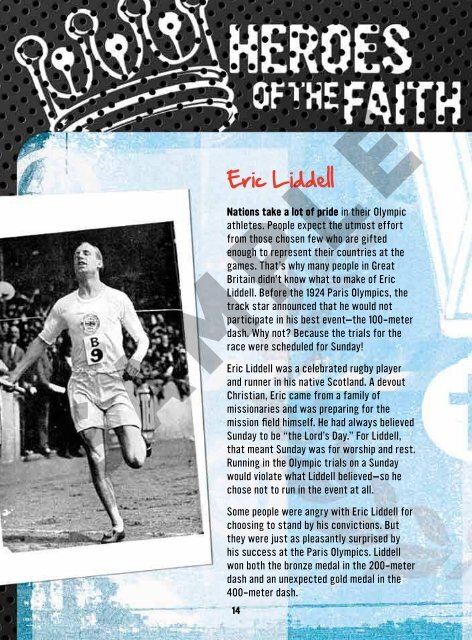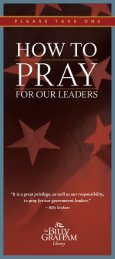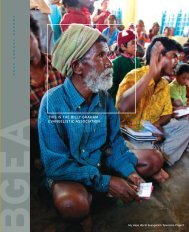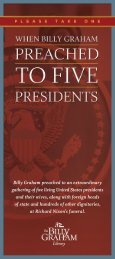1 DARE TO BE DIFFERENT >> 2 2 DARE TO BE DISCIPLINED ...
1 DARE TO BE DIFFERENT >> 2 2 DARE TO BE DISCIPLINED ...
1 DARE TO BE DIFFERENT >> 2 2 DARE TO BE DISCIPLINED ...
You also want an ePaper? Increase the reach of your titles
YUMPU automatically turns print PDFs into web optimized ePapers that Google loves.
Eric Liddell<br />
Nations take a lot of pride in their Olympic<br />
athletes. People expect the utmost effort<br />
from those chosen few who are gifted<br />
enough to represent their countries at the<br />
games. That’s why many people in Great<br />
Britain didn’t know what to make of Eric<br />
Liddell. Before the 1924 Paris Olympics, the<br />
track star announced that he would not<br />
participate in his best event—the 100-meter<br />
dash. Why not? Because the trials for the<br />
race were scheduled for Sunday!<br />
Eric Liddell was a celebrated rugby player<br />
and runner in his native Scotland. A devout<br />
Christian, Eric came from a family of<br />
missionaries and was preparing for the<br />
mission field himself. He had always believed<br />
Sunday to be “the Lord’s Day.” For Liddell,<br />
that meant Sunday was for worship and rest.<br />
Running in the Olympic trials on a Sunday<br />
would violate what Liddell believed—so he<br />
chose not to run in the event at all.<br />
SAMPLE<br />
Some people were angry with Eric Liddell for<br />
choosing to stand by his convictions. But<br />
they were just as pleasantly surprised by<br />
his success at the Paris Olympics. Liddell<br />
won both the bronze medal in the 200-meter<br />
dash and an unexpected gold medal in the<br />
400-meter dash.<br />
Eric Liddell went on to join his family in China as a medical missionary. He was<br />
always a popular Bible teacher and preacher. He spread the message of Christ<br />
in China from 1925 to 1943. In 1943, he was imprisoned in a Japanese internment<br />
camp with other missionaries and their families during World War II.<br />
Even in confinement, Liddell encouraged his fellow prisoners with Bible studies<br />
and prayer times. He also organized games for the youth and children in the prison<br />
camp. He spent early mornings and late nights in prayer and personal Bible study,<br />
often reading God’s Word by the light of a peanut-oil lamp. He died from the<br />
effects of a brain tumor in 1945, just a few months before the war ended.<br />
Liddell’s bold stand for Christ and the impact of his faith as a young man are<br />
portrayed in the motion picture Chariots of Fire. Even more impressive,<br />
however, are the numerous testimonies of his faith and devotion from friends<br />
and acquaintances.<br />
WhAT DO YOU ThiNk OThers ThOUghT Of eriC’s refUsAl <strong>TO</strong><br />
COMprOMise his DevOTiON <strong>TO</strong> gOD?<br />
SAMPLE<br />
WhY DO YOU ThiNk he WAsN’T AfrAiD <strong>TO</strong> DO ThiNgs ThAT<br />
brOUghT CriTiCisM Or perseCUTiON frOM OThers?<br />
14 15




![2008 [1.7 MB] - Billy Graham Evangelistic Association](https://img.yumpu.com/50285207/1/190x249/2008-17-mb-billy-graham-evangelistic-association.jpg?quality=85)



![2007 [3.8 MB] - Billy Graham Evangelistic Association](https://img.yumpu.com/42138844/1/190x253/2007-38-mb-billy-graham-evangelistic-association.jpg?quality=85)
![2012 [2.8 MB] - Billy Graham Evangelistic Association](https://img.yumpu.com/40385691/1/190x138/2012-28-mb-billy-graham-evangelistic-association.jpg?quality=85)






